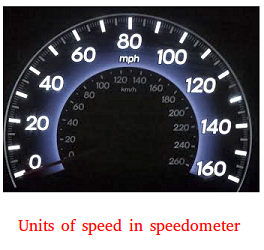Units of Speed
The most common units of speed used in math or physics are miles per hour and kilometers per
hour. These are the units the speedometer in your car will show.

However, to mention a few, there are other units of speed such as meters per second, feet per second, light-years per millennium, and knots.
Feet per second, but specially meters per second are usually used to
measure speed of animals, humans, and free fall objects. Knots is used
to measure the speed of ship and/or boats.
Note that the speed of light is 300,000 km/s
Changing Units of Speed
A skill that is extremely important in physics is converting a unit of speed to another. For example, you should know how to convert miles per hour to kilometers per hour (km/h).
Changing units is something that is done often in physics, so it is extremely important to master the technique.
The method to use is called chain-link conversion. In chain conversion, the original unit is multiplied by a conversion factor.
A conversion factor is a ratio of 2 units. For example, take a look at these two conversion factors.
The one on top can be used to convert minutes to seconds. Notice something very important with the first one. The unit for minutes is at the bottom.
In the conversion factor, the unit you are converting to is always on top.
How would you convert 120 seconds to minutes? Which conversion factor will you pick? You will pick the one at the bottom since second is at the bottom in the conversion factor and do the math as shown.
This is equal to 2 minutes. Notice how the unit of second cancelled. Whenever the unit is on top and at the bottom, it gets cancelled.
Convert 60 miles per hour (60 m/h) to kilometer per hour (km/h)
The unit of time is the same. How do I know? Well you are converting from 60 miles per hour to km per hour. The unit of time shown in bold is the same as you can see. Therefore, all you need to do is to change 60 miles to kilometers and you are all set!
You thought that was complicated? Right?
Next, you need to know the relationship between miles and kilometers. Since 1 mile = 1.60934 kilometer, your two conversion factors are.
Since you are converting from miles to kilometer, you will use the one below.
We get 96.56 km/h and it is close to 100 km/h. Look at your speedometer above to verify this.
Convert 60 miles per hour (60 m/h) to kilometer per second (km/s)
We have already converted to km/h. Thus, all we need to do is to change the unit of time. Recall that 1 hour = 3600 seconds, so here is your conversion factor.
|
96.56 km
1 hour
|
× |
1 hour
3600 s
|
|
96.56 km
1 hour
|
× |
1 hour
3600 s
|
This is equal to 0.02682 km/s or 26.82 meter per second. Convert this one yourself to verify the 26.82 m/s!
This ends our lesson about units of speed.
This is equal to 0.02682 km/s or 26.82 meter per second.
Do the conversion yourself in order to verify the 26.82 m/s!
This ends our lesson about units of speed.